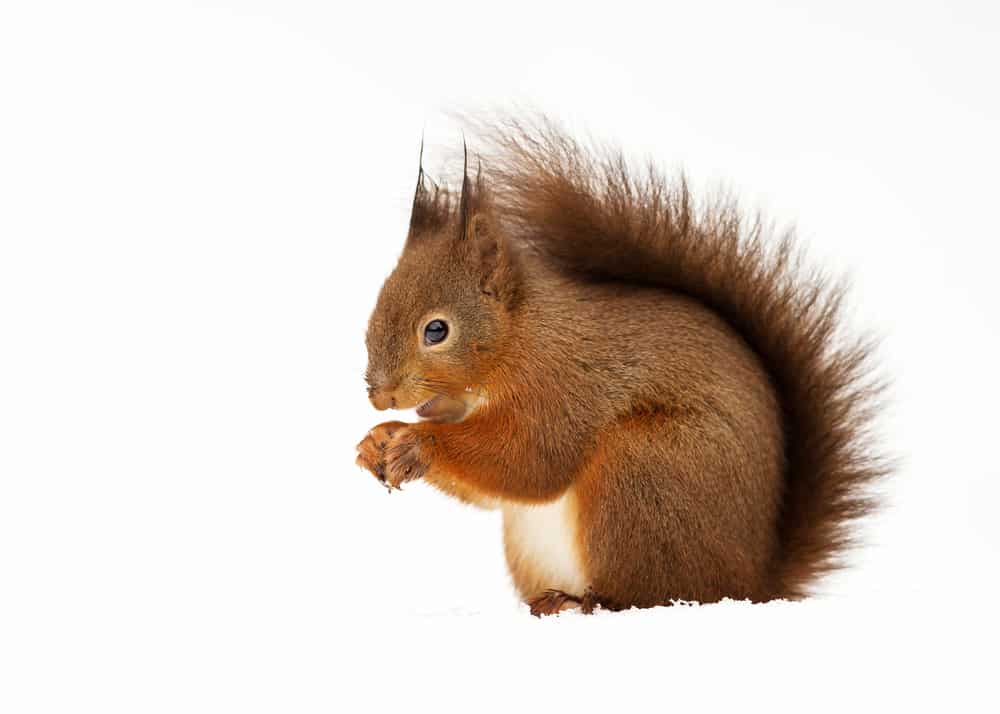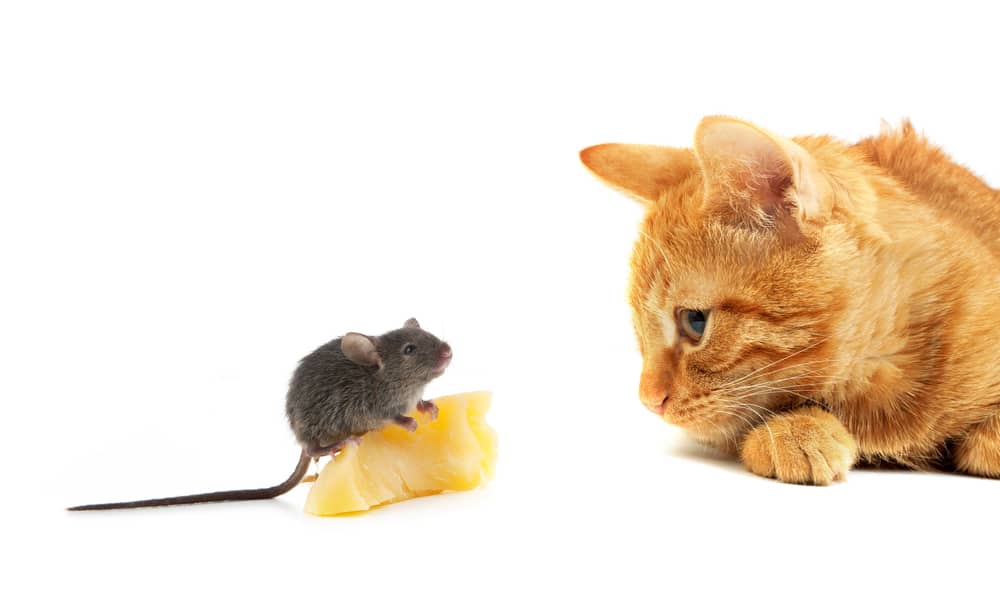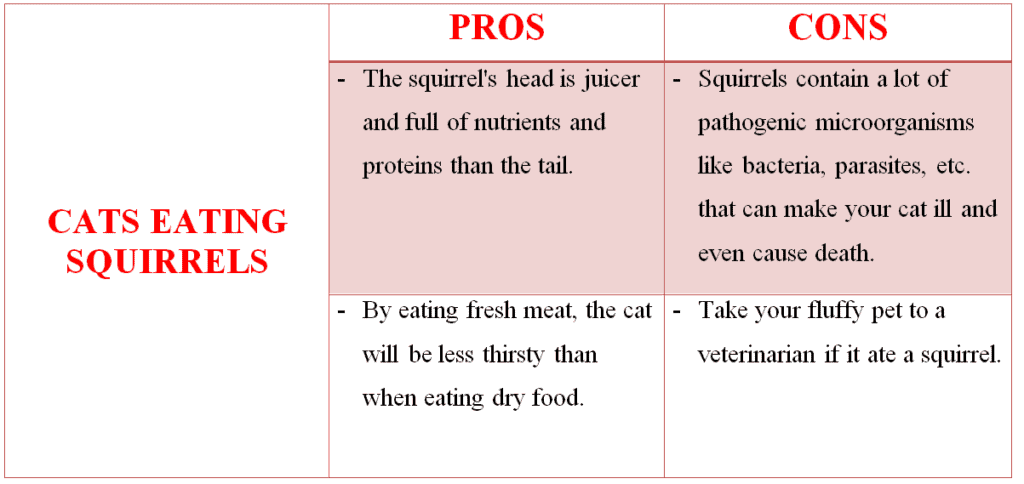
Feral and domestic cats that have the opportunity to go outside hunt and eat all kinds of small animals, from rodents, birds, reptiles, to rabbits and squirrels, and insects. Yes, some cats even eat rabbits or squirrels!
My cat lives only indoors, and although she is born and raised without having any contact with the outside world, her instinct as a ferocious predator is not dormant – she hunts from the window everything that reaches the windowsill or every insect that enters her home. Nothing makes her happier than bringing a fly to my feet!
If you have an indoor-outdoor cat, the most prone to hunting and eating squirrels, other rodents, birds, and lizards are those that are fed with food scraps. But that doesn’t mean that if a cat is well-fed, it would stop hunting. There are cats that even if they were well fed at home, will still go hunting, and return home with their prey later. It is said about these cats that they want more variety in their diet (if they are fed the same food repeatedly).
Cats are born to hunt; they are natural predators. They will probably chase anything that runs away. The most common types of rodents cats hunt and sometimes eat are squirrels, ground squirrels, flying squirrels, chipmunks, rabbits, hares, mice, rats, and hamsters, but the squirrel’s fluffy tail will make an attractive target out of it for sure!
Do cats hunt and eat squirrels and other rodents?

Red, grey squirrels, chipmunks, or anything fluffy that runs away makes a good chase, but this doesn’t mean cats will always catch squirrels. They are known for their ability to climb trees or tall objects. Mice, rats, and hamsters are good at hiding in the ground. Therefore, some of them may have a second chance when facing a cat. Ill rodents won’t have a chance at escaping.
Researchers say that if the prey is too big (like rabbits and squirrels), two to four adult cats will cooperate to catch it – they will surround the prey and share it later.
When it comes to kittens, sometimes squirrels can be bigger than them, making them impossible to catch.
Do cats eat baby squirrels?
Baby squirrels are more often eaten by cats than adult squirrels (they are faster and smarter than many domestic cats).
Most domestic cats will only hunt baby squirrels, while feral/wild cats will also hunt adult squirrels because they are more specialized in hunting.
Can cats eat dead squirrels?
Cats prefer fresh meat, but they would also eat a dead squirrel if there would be nothing else to eat and they would be starving.
Do cats eat squirrels’ head or tail?
If cats had a choice, they would always choose the head, because it is juicy and full of nutrients and animal proteins, unlike the tail. But unfortunately, a squirrel’s mouth contains a lot of bacteria, which can make your cat sick.
Can cats get sick if they eat a squirrel?
Eating squirrels comes with a positive aspect – because fresh meat is much juicier than their dry food, the cat will no longer need to hydrate so often (drink water often).
The negative aspect is represented by the fact that there is a risk that the cat will get sick if it consumes squirrels. Squirrels can transmit to cats many diseases, including rabies (although it is not common). Therefore, make sure your cat has all its vaccines and deworming up to date.
What should you do if a cat ate a squirrel?
Normally you should wait a while and if you notice any clinical signs that seem suspect in your cat, go to the vet.
Squirrels carry many microorganisms (bacteria, parasites, etc.), which can infect your cat, and if your cat ate a squirrel it risks getting sick and even dying.
Do squirrels eat cat food?
Squirrels are rodents; they prefer nuts, seeds, and hazelnuts the most. Dry cat food does not contain either and not even vegetables, but squirrels seem to love dry cat food. Of course, this is not healthy for them; squirrels can even become obese if they eat too much cat food for a long time, in addition to other medical conditions.
You can stop squirrels from stealing your cat’s food by mounting a feeder on a nearby tree. If they have nuts and seeds at hand, they will not eat your cat’s food.
Can squirrels attack cats?
Squirrels attack cats and even small dogs. When they feel in danger they become agitated; squirrels can scratch and bite, and their bite is not very pleasant. There are known cases when they attacked people, so why wouldn’t squirrels attack a cat, especially when they feel in danger?
How do you stop cats chasing squirrels?
The number one rule is for the cat to be well fed – no longer being hungry, the chances of hunting squirrels (or other animals) decrease.
Another option is for your cat to wear a collar with a bell on it – it will be harder for it to prey on a squirrel with the bell around its neck because it will make noise at every step. But keep in mind that cat collars must be elastic so that if the cat gets stuck somewhere (in a fence, for example) it can get its head out of the collar, otherwise it risks suffocating and dying.
Other creatures that cats hunt and eat are:
- Reptiles: lizards, snakes, and sometimes small turtles;
- Amphibians: toads, frogs, and salamanders.
- Birds: robins, pigeons, owls, hawks, eagles;
- Other small mammals: shrews, moles;
- Insects: spiders, flies, mosquitoes, centipedes, worms, roaches, lady bugs, etc.
Why cats “play” with their prey?
I assume you all noticed that behavior when your cat is shaking her head with the toy in its mouth or a small animal that it brought on your porch. But have you ever wondered why cats have this behavior? I know it seems like they play, but the truth is that cats adopt this behavior to make the prey weaker (dizzy) before killing it. Then, the cat bites hard the prey behind the neck, at the base of the skull to separate the spinal cord from the brainstem. This behavior of “playing” with their prey before killing it is considered a displacement behavior, which is caused by the need to kill its prey and, at the same time, by the fear of being (potentially) injured by the animal.
Although well-fed cats are not said to pose a major threat to wildlife, hunting and hunger are not as closely linked as one might think – even well-fed cats can hunt and kill all kinds of live organisms. This is becoming a cause for concern due to the direct impact of cats on native species and competition with native predators.
The animals they kill are considered secondary prey for well-fed cats, but given that cats are in large numbers in different parts of the globe, they have contributed to the decline of many small species of vertebrates, including many species of birds. Rare or endangered species of mammals, birds, and reptiles have been documented over the years as victims of wild cats.
Please Pin & Share!

Conclusions
Although well-fed cats are no longer hungry, they can still hunt and kill wildlife.
Domestic cats will likely eat baby squirrels than adult squirrels because they are easy to catch. Adult squirrels are much clever and fast than most domestic cats.
If your cat ate a squirrel, take it to the veterinarian because squirrels carry all sorts of diseases that might infect your cat.
If your cat has the opportunity to go outside, expect it to bring you home all sorts of living creatures, from small mammals, birds, lizards, to insects.
I hope this article answered your questions about cats and squirrels.
Please Share Your Thoughts in the Comment Section Below!
Happy Cat-Keeping!
